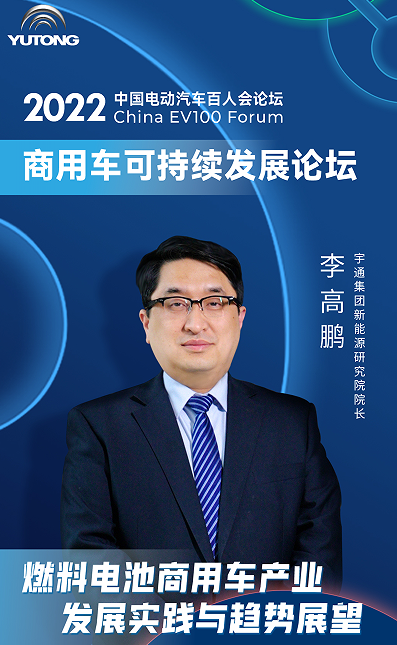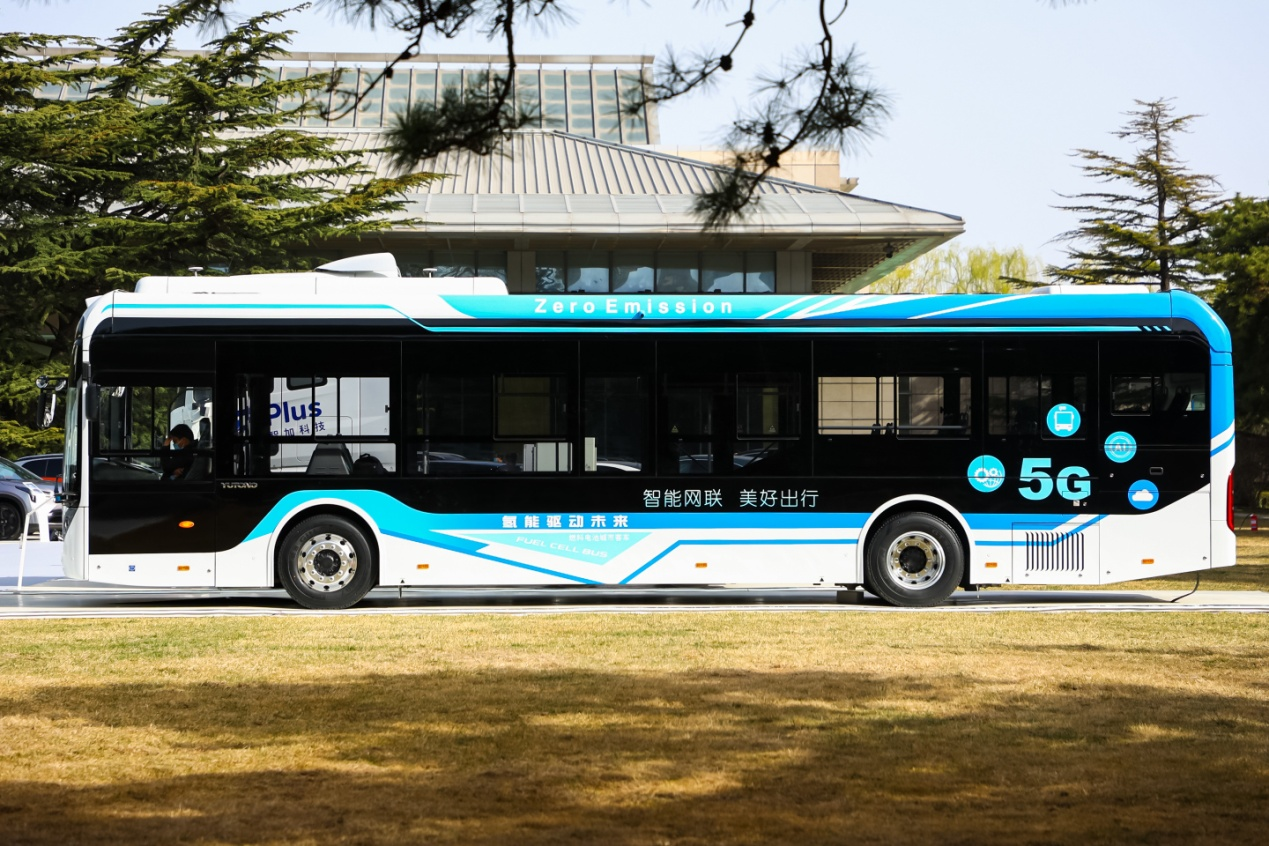Author: Dazhao
Recently, with the publication of the “Medium and Long-term Development Plan for the Hydrogen Energy Industry (2021-2035)” and the transmission of voices on the development of hydrogen fuel cells in the 2022 Hundred People’s Meeting, China’s hydrogen fuel cell industry has ushered in a small climax.
At the Hundred People’s Meeting, Li Gaopeng, dean of the New Energy Research Institute of Yutong Group, a representative of hydrogen fuel cell commercial vehicles, delivered a speech with the theme of “Development Practice and Trend Prospects of Fuel Cell Commercial Vehicles”. He expressed his views on the development of fuel cells and shared Yutong’s layout in fuel cell commercial vehicles.

In response to Yutong’s technical route layout and some product issues, a journalist from “Electric Power” also conducted a brief interview with Li Gaopeng.
To respond to global climate change, major countries and regions around the world are undergoing energy transformation. In September 2020, China clearly stated the important strategic goal of “peak carbon dioxide emissions” by 2030 and “carbon neutrality” by 2060.
To achieve the dual-carbon goal, Li Gaopeng believes that “we need to store intermittent energy such as photovoltaics and wind power through hydrogen and batteries, in order to achieve a renewable energy-based energy revolution.”
At present, the International Energy Agency, the United States, the European Union, Japan, and China have all released hydrogen energy roadmaps, and it is expected that green hydrogen will account for 12%-15% of terminal energy by 2050. Countries will increase their financial investment in the hydrogen energy industry.
In the application of hydrogen energy, hydrogen fuel cell vehicles are an important part. In Li Gaopeng’s view, fuel cell vehicles are an important application of hydrogen energy in the transportation sector and a technological high ground.
Data shows that in the past decade, global sales of fuel cell vehicles have been increasing year by year, with a cumulative sales of 48,000 vehicles. From 2010 to 2015, only a few, dozens, and hundreds of vehicles were sold each year. However, since 2016, the number has exceeded thousands, and by 2021, it has exceeded 16,000 vehicles.
The promotion of fuel cell vehicles in China first started in the commercial vehicle field. According to the data of vehicle insurance in the past five years, the insurance of fuel cell vehicles in China is mainly for passenger and freight vehicles.
In 2020, the Ministry of Finance, the Ministry of Industry and Information Technology, and other five departments issued the “Notice on Carrying Out Demonstration and Application of Fuel Cell Vehicles.” In August 2021, the first batch of Shanghai, Guangdong, and Beijing urban clusters started the notification. In December 2021, Henan and Hebei urban clusters also obtained approval.
Currently, the national demonstration application urban clusters for fuel cell vehicles have formed a “3 + 2” pattern.Li Gaopeng said that China’s hydrogen energy development route is distinctive. Through demonstration projects, it drives the breakthrough of core technologies, gradually realizes the independent controllability of the industrial chain, and the market-oriented development of hydrogen energy is becoming mature.
Regarding the application relationship between hydrogen energy and pure electric, Li Gaopeng believes that as important applications and technological commanding heights in the transportation field, pure electric vehicles are suitable for urban, short-distance scenarios, while fuel cell vehicles have shorter hydrogen refueling time and higher energy density, and are more suitable for medium and heavy-duty, medium and long-distance commercial vehicle fields. The two complement each other, coexist for a long time, and jointly promote the electrification of vehicles and the low-carbonization of energy.
Li Gaopeng said that Yutong will take the lead in bus products, adhere to the combination of cards and passengers, and drive all-field commercial vehicle products towards the hydrogen era.
Currently, as a global leader in the bus industry, Yutong has built a hydrogen fuel cell vehicle application supporting system and related product technology research and development.
In terms of buses, in 2014, Yutong obtained the first domestic fuel cell bus qualification certification and completed the research and development of third-generation hydrogen fuel cell bus products. In 2021, Yutong’s fuel cell truck production qualification was officially approved, and the development of sample vehicles for heavy-duty tractors, urban dump/mixer, sanitation, logistics, and other products was successfully completed.
In terms of supporting layout, Yutong has built the first hydrogen refueling station in the Central Plains region; obtained the installation qualification of on-board hydrogen systems; built the Zhengzhou Fuel Cell and Hydrogen Energy Engineering Technology Research Center; built the Henan Province Hydrogen Energy and Fuel Cell Engineering Technology Research Center; and was approved to establish the Henan Province Fuel Cell Commercial Vehicle Innovation Center in 2020.
Li Gaopeng believes that the current hydrogen fuel cell vehicle industry in China has entered the nurturing stage comprehensively.
Li Gaopeng said that Yutong will continue to do a good job in basic technology development, market research, product planning, product development and verification, and other core work, seize the opportunity of national demonstration, promote the demonstration and large-scale promotion of hydrogen fuel cell commercial vehicles in all scenarios. Taking the “demonstration city-key city-national promotion” three-step strategy, we will give full play to the leading effect of demonstration enterprises.
Regarding the recently popular battery swapping, Li Gaopeng told Electric Momentum that Yutong also supports the battery swapping technology program. The reason is that compared with pure electric, fuel cells are suitable for high-speed heavy-duty vehicles; compared with charging, battery swapping is suitable for high-speed heavy-duty vehicles or vehicles that operate 24 hours a day. Different vehicle models match different schemes.
At the Hundred People’s Meeting opened on March 25th, Yutong Bus’s autonomous driving hydrogen fuel cell bus debuted in the forum exhibition area.
This vehicle adopts an electric-hybrid system with hydrogen refueling for 10 minutes, and a range of 500km. The vehicle has functions such as “automatic acceleration and deceleration, automatic steering, vehicle-road coordination, automatic identification of traffic lights passing intersections, automatic entry, and automatic parking”, achieving Level 3 autonomous driving ability.## Introduction
Li Gaopeng revealed some information about Yutong’s fuel cell products and technical specifications.
Third Generation Hydrogen Fuel Cell Bus
Yutong’s third-generation hydrogen fuel cell bus has successfully solved the problem of starting at -30℃, and has passed various durability and reliability tests. Its safety performance, water-resistant performance, and collision testing have all performed outstandingly. In terms of vehicle dynamics, it can also meet the requirements for city environments such as plains, mountainous areas, and high-altitude areas. Through multiple tests, the safety and reliability of the entire vehicle are ensured.
Fuel Efficiency and Energy Management
Through the iterative improvement of the third-generation product technology, Yutong’s fuel cell bus has greatly reduced hydrogen consumption. Under actual road operating conditions, the hydrogen consumption of the 10-meter and 12-meter fuel cell buses has been reduced to below 5kg/100km.
This is a significant technological advancement in the past few years in fuel cell power systems, vehicle integration, and energy management. Yutong has developed an efficient energy-type electric-electric hybrid power system, which continuously optimizes energy management strategies to reduce the entire vehicle’s hydrogen consumption.
Li Gaopeng revealed that Yutong’s fuel cell buses can run for two days on just one hydrogen refueling, greatly lowering the operational costs for users. In addition, the fuel cell waste heat recovery technology used during winter ensures that not only does the winter mileage remain unaffected, but the heating effect inside the bus is much better than that of pure electric buses.
Durability
In addition to energy consumption, the durability of fuel cell systems is also a critical and urgent issue that needs to be addressed for the promotion of fuel cell vehicles.
Based on the response characteristics of fuel cells, Yutong has significantly increased the service life of the fuel cell system by optimizing the control strategy of the power system. According to statistics based on Yutong’s vehicle data in Jiangsu, the average operating time of the fuel cell system exceeded 8,800 hours, and the maximum attenuation of commonly used power points was within 2% after testing. This result meets the requirements for the entire life cycle of buses.
Li Gaopeng believes that breaking through the durability of fuel cells will lay a good foundation for Yutong to massively promote fuel cell buses.
Application and Endorsements
According to Li Gaopeng, Yutong’s fuel cell buses have accumulated more than 35 million kilometers of operation in Henan Zhengzhou, Hebei Zhangjiakou, Shandong Weifang, and Jiangsu Zhangjiagang, and have been highly endorsed by the public transportation customers and drivers.
Additionally, during the 2022 Beijing Winter Olympics and Paralympics, 185 low hydrogen consumption, high safety, and environmental adaptability hydrogen fuel cell buses from Yutong will serve the whole area of Beijing, Yanqing, and Zhangjiakou. Yutong fuel cell buses will provide reliable, quality assurance for the Beijing Winter Olympics, earning high praise from the Organizing Committee.In 2021, Yutong has completed the development of fuel cell main sales truck products for heavy-duty tractors, urban dump/mixing, sanitation, logistics, and other series. 49-ton tractor, 31-ton dump truck, 31-ton cement mixer truck, 18-25 ton sanitation truck, 4.5-18 ton logistics truck, etc. have all been developed and have sales conditions.
Li Gaopeng stated that Yutong’s fuel cell buses and trucks are ready for the national demonstration and promotion in the next four years.
Regarding the current development of hydrogen fuel cell technology, Li Gaopeng concluded that with the favorable policies and advanced lab products, the blueprint of a green and sustainable future has already been drawn.
However, Li Gaopeng also pointed out that there are still multiple challenges facing the large-scale promotion of hydrogen fuel cell buses, such as infrastructure, supporting facilities, and the development of key technologies.
To address these issues, Li Gaopeng recommended further clarification of the governing department, streamlining the approval process, increasing subsidies for fuel cell vehicles and refueling stations, expanding the industry scale, and ultimately attracting more consumers and operators to enter the market.
At the same time, in the bottleneck fields such as catalysts and proton membranes, China should establish special funds, strengthen cooperation between industry, academia, and research institutions, rapidly breakthrough key technologies such as vehicle lifespan and high-power fuel cells, and comprehensively promote the independent and high-quality development of the hydrogen energy industry chain.
This article is a translation by ChatGPT of a Chinese report from 42HOW. If you have any questions about it, please email bd@42how.com.
